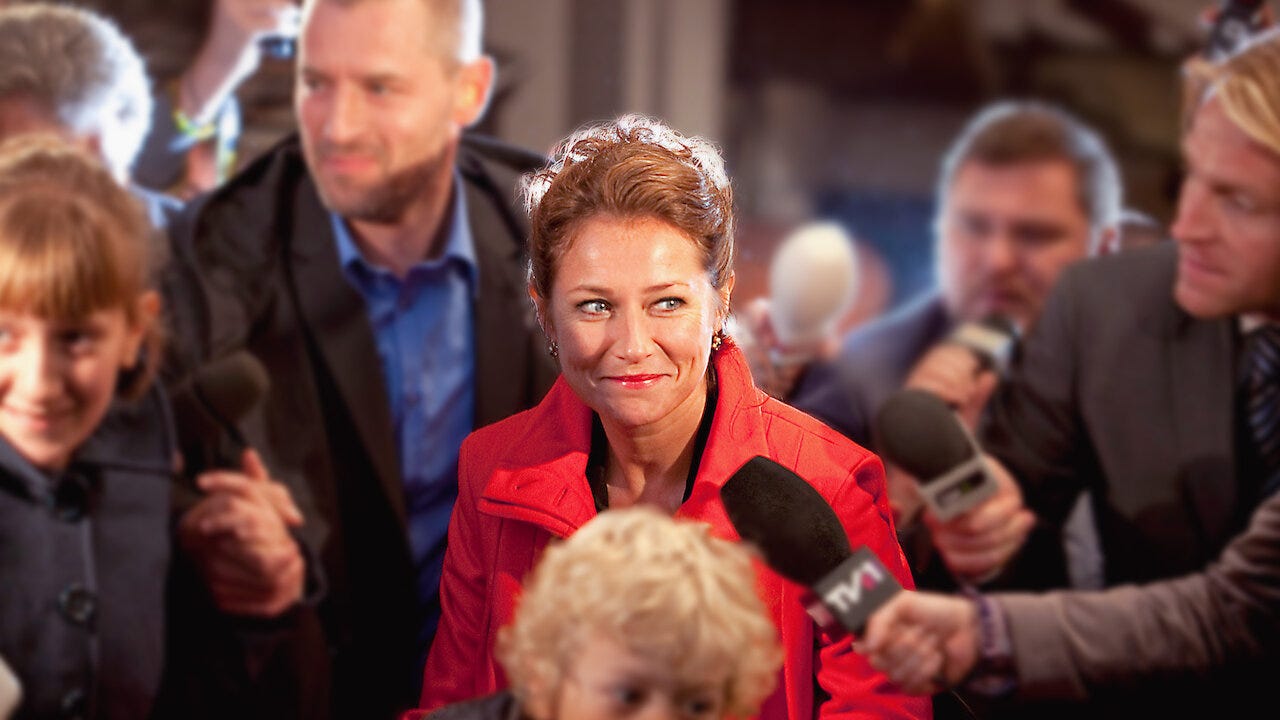The day I met my favourite Danish actress
The world loved seasons I-III of Borgen, the Danish political drama which was screened in over 70 countries to rapturous reviews. Not just because of the story and acting, but in a sense, what many viewers (and reviewers) fell in love with was Denmark itself.
Because, while crime dramaThe Killing had gripped the globe with its gruesome crimes and Sarah Lund’s knitwear, Borgen beguiled with its depictions of strong career women, stay-at-home fathers, and the convoluted world of Danish multi-party coalition politics.
Ah! So this is how the citizens of a wealthy, civilised, sexy, well-dressed, well-functioning democracy really lived!
I was due to interview Borgen’s star, Sidse Babette Knudsen, who plays centrist prime minister Birgitte Nyborg, before the fourth season launched in 2022, so I rewatched the first ever episode to remind myself how great it was.
What a blistering hour of drama! There was sex, death, political intrigue and more copper PH artichoke lamps than a branch of Louis Poulson, all within the first 20 minutes. The various themes expanded upon over the ensuing episodes were already driving the action: power vs principle, the tension between work and home life, the grubby pragmatism of betrayal, the endless venality of journalists, plus lots of cool jazz and flattering lighting. The characters were compelling and real.
Over time, we saw the impact Nyborg’s political success had on her colleagues, her husband, her children, and her soul. Yes, it all got a bit soapy in season III, but we loved seeing more of the backstage life of this powerful woman who almost never cried but instead did a lot of angry throwing of stuff (and I really liked it when she had that affair with the Englishman). For those of us whose leaders live in remote institutions like Downing Street, the Elysée Palace or the White House, it was particularly fascinating to see a national leader go home to her family and eat lasagne instead of, I don’t know, having a transfusion of liquid Uranium, or whatever Rishi Sunak’s alien overlords prescribe when he returns from a hard day crushing the hopes and dreams of ordinary British people.
Borgen’s writers also appeared to have mystical powers to predict the future: they wrote about Denmark’s first female prime minister, and lo and behold, Denmark elected its first female prime minister. In season IV, the Greenlanders discovered oil. Don’t say they didn’t warn you!
And did I mention the sexiness? There wasn’t a cast member you didn’t want to shag. Except maybe Søren Malling. No! Dammit! INCLUDING Søren Malling! As with the Spice Girls, there was a character for everyone: career mothers sympathised with Nyborg; ambitious, principled young women recognised the hurdles faced by journalist-turned-spin-doctor Katrine Fønsmark; weary middle-aged men sympathised with Malling’s increasingly haggard TV news editor, Torben; and, well, if you know someone who identified closely with Pilou Asbæk’s Kasper Juul, it’s probably best to get them out of your lives as soon as possible.
So, though 99% of foreign viewers were completely oblivious to the fact that Borgen’s characters often had direct real life counterparts, it didn’t matter. Whether you lived in London or Lima the show offered universally recognisable archetypes. Power-crazed psychopaths, reactionary racists, slimy journalists and tobacco-breathed old lefties are, sadly, ubiquitous.
What wasn’t so universal was the Danish lifestyle: in this respect Borgen’s appeal was more aspirational. The world marvelled, for instance, at the spacious, high-ceilinged houses and apartments in which the main characters of Borgen dwelled. It is true, British people were initially confused by some of the idiosyncrasies of Danish interior design (couldn’t the Danes afford wall-to-wall carpeting?). But the Danish capital had never looked more ravishing.
The acting was exceptional of course. And, if anything, season IV is even better. Sidse Babette Knudsen conveys disdain, fear, lust and horror with the tiniest twitch of that now-iconic nose.
“To be honest, she came back to me at the click of a finger,” Sidse, a poised, bespectacled 53 year old told me when we met at Copenhagen’s Hotel d’Angleterre. “I was really curious to find out where she is now because the world has changed in so many ways, and she is an old fashioned politician with old fashioned values.”
In truth, Borgen was never a ‘global hit’ in the popular sense. It never had anything like the audiences of series like Peaky Blinders, Sherlock or The Crown. It doesn’t even make imdb’s Top 100 most watched TV shows of all time (No32: The Originals? No, me neither). It was more influential than popular. Newsweek called it ‘the best TV series you have never seen’, for instance. In Britain, it aired on BBC4 (whose schedules are usually filled with cultural documentaries and live opera), but it hit at a time when Brits were enduring their own coalition government nightmare and were desperate for role models.
It was the kind of show that people who smugly tell you that they ‘don’t really watch TV’ made an effort to see. Demographers probably have a clever term for them, but a simple metric would be that Borgen was watched by people whose books covered more wall space than their TV screens. Having worked in TV, I can confirm that the people who make television programmes don’t watch television either. But they did watch Borgen.
As with the first season, gender is never really a plot topic in sIV, although Nyborg is now facing the menopause and at one point early in the new season makes a cringey lunge for one of her younger male subordinates.
“It’s no big deal in Denmark. Maybe in other countries you’d have entire episodes about her being a woman in a man’s world,” Knudsen told me. “But that’s not how we perceive ourselves here.”
Stephen King is a fan of Borgen, and it is Netflix founder Reed Hasting’s favourite TV series ever, hence the platform’s reruns of the previous seasons and the co-production of season IV with DR. Its original success in the States lead to numerous offers for Knudsen to play “women in suits being in charge of things” including roles in alongside Tom Hanks in a DaVinci Code sequel, and Hugh Laurie in David Hare’s BBC drama, Roadkill, and the lead in Peter Strickland’s 2014 lesbian psychodrama, ‘The Duke of Burgundy’. “I loved that the producers of that associated me with Borgen, because it was quite extreme,” she laughed.
Since Borgen’s breakthrough, Knudsen has also worked extensively in France, bringing her career back full circle as she trained in Paris as an 18 year old. “I did an audition for a school there, just for the experience, to prepare for applying to the Danish acting school, but then I got in.” She ended up graduating, the only foreigner to do so, but on returning to Denmark, Knudsen found her method clashed with the more laid back Danish approach of the then-emerging Dogme movement. “My training was very physical - clown, mime, Commedia dell’arte - and when I came to Denmark basically they thought I was a bit ridiculous. I soon learned to do all my warm-ups and prayers secretly.”
Now, Knudsen is one of the country’s most respected actresses. “She is an amazing talent,” show-runner Adam Price told me. “She brings her humanity to every scene, and she is constantly aware of the emotional topography of the character. In the new season, Birgitte has this speech about how she is having the time of her life, working 24/7, with no husband or young kids to worry about, but you can see Sidse’s smile doesn’t quite reach her eyes, it’s a little note betraying the character.”
In Denmark, Knudsen’s fame is not such a burden as it might be in a larger country. She still lives in the heart of Copenhagen with her teenage son. “I do the shopping, walk around, live very happily. Danes are very nice. I can sense I am getting more thumbs up now this new season is out. And I think they must use Borgen in the language schools here because I get a lot of Eastern European women telling me they love the show.”
“See you in ten years,” Knudsen had joked to Price at the wrap party for season III. So what about season V in another ten years? The final episode leaves things very open for Birgitte Nyborg. Would the character still be in politics in her early 60s? “Oh definitely, oh yeah,” says Knudsen. “Secretly, I’ve always told myself that she feels she is put on this earth to lead her country, or at least have as much influence as possible.”
Sounds a bit like the current Danish prime minister, actually.
END





